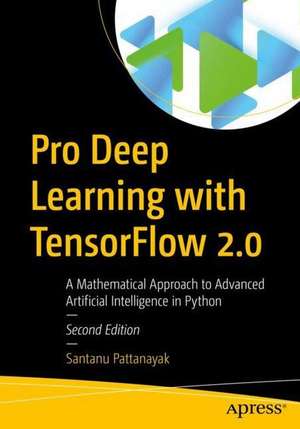Pro Deep Learning with TensorFlow 2.0: A Mathematical Approach to Advanced Artificial Intelligence in Python
Autor Santanu Pattanayaken Limba Engleză Paperback – 2023
Pro Deep Learning with TensorFlow 2.0 begins with the mathematical and core technical foundations of deep learning. Next, you will learn about convolutional neural networks, including new convolutional methods such as dilated convolution, depth-wise separable convolution, and their implementation. You’ll then gain an understanding of natural language processing in advanced network architectures such as transformers and various attention mechanisms relevant to natural language processing and neural networks in general. As you progress through the book, you’ll explore unsupervised learning frameworks that reflect the current state of deep learning methods, such as autoencoders and variational autoencoders. The final chapter covers the advanced topic of generative adversarial networks and their variants, such as cycle consistency GANs and graph neural network techniques such as graph attention networks and GraphSAGE.
Upon completing this book, you will understand the mathematical foundations and concepts of deep learning, and be able to use the prototypes demonstrated to build new deep learning applications.
What You Will Learn
- Understand full-stack deep learning using TensorFlow 2.0
- Gain an understanding of the mathematical foundations of deep learning
- Deploy complex deep learning solutions in production using TensorFlow 2.0
- Understand generative adversarial networks, graph attention networks, and GraphSAGE
Data scientists and machine learning professionals, software developers, graduate students, and open source enthusiasts.
Preț: 331.02 lei
Preț vechi: 413.77 lei
-20% Nou
Puncte Express: 497
Preț estimativ în valută:
63.36€ • 68.85$ • 53.26£
63.36€ • 68.85$ • 53.26£
Carte disponibilă
Livrare economică 31 martie-14 aprilie
Livrare express 14-20 martie pentru 104.34 lei
Preluare comenzi: 021 569.72.76
Specificații
ISBN-13: 9781484289303
ISBN-10: 1484289307
Pagini: 652
Ilustrații: XX, 652 p. 213 illus.
Dimensiuni: 178 x 254 x 40 mm
Greutate: 1.15 kg
Ediția:2nd ed.
Editura: Apress
Colecția Apress
Locul publicării:Berkeley, CA, United States
ISBN-10: 1484289307
Pagini: 652
Ilustrații: XX, 652 p. 213 illus.
Dimensiuni: 178 x 254 x 40 mm
Greutate: 1.15 kg
Ediția:2nd ed.
Editura: Apress
Colecția Apress
Locul publicării:Berkeley, CA, United States
Cuprins
Chapter 1: Mathematical Foundations.- Chapter 2: Introduction to Deep learning Concepts and Tensorflow 2.0.- Chapter 3: Convolutional Neural networks.- Chapter 4: Natural Language Processing.- Chapter 5: Unsupervised Learning with Restricted Boltzmann Machines and Auto-encoders.- Chapter 6: Advanced Neural Networks.
Notă biografică
Santanu Pattanayak works as a Senior Staff Machine Learning Specialist at Qualcomm Corp R&D and is the author of Quantum Machine Learning with Python, published by Apress. He has more than 16 years of experience, having worked at GE, Capgemini, and IBM before joining Qualcomm. He graduated with a degree in electrical engineering from Jadavpur University, Kolkata and is an avid math enthusiast. Santanu has a master’s degree in data science from the Indian Institute of Technology (IIT), Hyderabad. He also participates in Kaggle competitions in his spare time, where he ranks in the top 500. Currently, he resides in Bangalore with his wife.
Textul de pe ultima copertă
This book builds upon the foundations established in its first edition, with updated chapters and the latest code implementations to bring it up to date with Tensorflow 2.0.
Pro Deep Learning with TensorFlow 2.0 begins with the mathematical and core technical foundations of deep learning. Next, you will learn about convolutional neural networks, including new convolutional methods such as dilated convolution, depth-wise separable convolution, and their implementation. You’ll then gain an understanding of natural language processing in advanced network architectures such as transformers and various attention mechanisms relevant to natural language processing and neural networks in general. As you progress through the book, you’ll explore unsupervised learning frameworks that reflect the current state of deep learning methods, such as autoencoders and variational autoencoders. The final chapter covers the advanced topic of generative adversarial networks and their variants, such as cycle consistency GANs and graph neural network techniques such as Node2Vec, GCN, GraphSAGE, and graph attention networks.
Upon completing this book, you will understand the mathematical foundations and concepts of deep learning, and be able to use the prototypes demonstrated to build new deep learning applications.
You will:
Pro Deep Learning with TensorFlow 2.0 begins with the mathematical and core technical foundations of deep learning. Next, you will learn about convolutional neural networks, including new convolutional methods such as dilated convolution, depth-wise separable convolution, and their implementation. You’ll then gain an understanding of natural language processing in advanced network architectures such as transformers and various attention mechanisms relevant to natural language processing and neural networks in general. As you progress through the book, you’ll explore unsupervised learning frameworks that reflect the current state of deep learning methods, such as autoencoders and variational autoencoders. The final chapter covers the advanced topic of generative adversarial networks and their variants, such as cycle consistency GANs and graph neural network techniques such as Node2Vec, GCN, GraphSAGE, and graph attention networks.
Upon completing this book, you will understand the mathematical foundations and concepts of deep learning, and be able to use the prototypes demonstrated to build new deep learning applications.
You will:
- Understand full-stack deep learning using TensorFlow 2.0
- Gain an understanding of the mathematical foundations of deep learning
- Deploy complex deep learning solutions in production using TensorFlow 2.0
- Understand generative adversarial networks, graph attention networks, and GraphSAGE
Caracteristici
Teaches how to deploy deep learning applications using TensorFlow 2.0 in a relatively short period of time Explains different deep learning methods for supervised and unsupervised machine learning Covers advanced deep learning techniques such as Generative Adversarial Networks and Graph neural Networks
